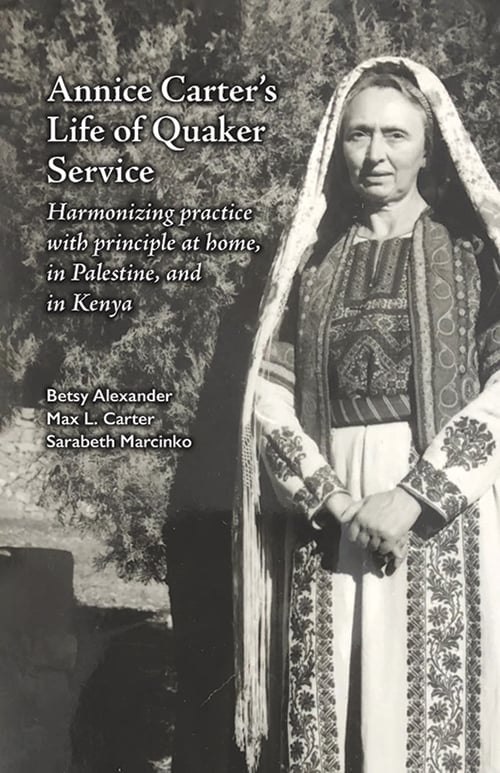
Annice Carter’s Life of Quaker Service: Harmonizing Practice with Principle at Home, in Palestine, and in Kenya
Reviewed by Lauren Brownlee
October 1, 2025
By Betsy Alexander, Max L. Carter, and Sarabeth Marcinko. Friends United Press, 2023. 266 pages. $19.99/paperback.
This biography of twentieth-century Friend Annice Carter (1902–1988) tells the life story of a woman whose legacy both reflects and shapes Friends’ experiences today. It was researched and written by three of her descendants: Betsy Alexander, Max Carter, and Sarabeth Marcinko (all grandchildren of Annice’s siblings).
The book’s title reflects Annice’s desire to serve the world as a faithful Friend. As the authors write, “Wherever she was—on the mission field, at work, or at home—Annice endeavored to be ‘usable’ in service for Christ.” As a missionary in both Palestine and Kenya, she wanted to share her view of the Christian experience: “a love for and desire to be of service to our fellow men instilled through a love of God, our common Father.”
Many Quakers today know and love Ramallah Friends School. The book focuses especially on Annice’s time as a staff member and leader at Ramallah’s Friends Girls School during several periods from 1929 through the 1960s (a time when the schools for girls and boys were connected but distinct). Through her work at the school, she “strove to instill in students the Quaker ideals of brotherly love, peace, and justice.” She invested in the academic, reputational, and financial trajectory of the school, helping to set it on the impressive path it is on today. Annice was a force of nature who spoke her mind to her relatives, to Israeli soldiers, and to anyone who tried to ignore the injustices of what she witnessed in Palestine. I believe her story will resonate with many who seek to put their faith into action in challenging times.
She felt a clear and strong desire to let her life speak and to encourage and empower those around her, at home in Indiana and all around the world, to do the same. Her light shined as an educator; as an editor of The Friends Missionary Advocate, the periodical of the United Society of Friends Women International; as director of Quaker Village retirement community in Indiana; and in service to her myriad faith communities. Her life exemplifies that there is not one way to live our purpose.
At one point the authors note that “Annice’s sentiments clearly bent towards orthopraxis rather than orthodoxy.” Her life is a fascinating study in the complexities of faith and practice. As people asked her about walking in the literal footprints of Jesus, the authors believe that for Annice, “the important ‘footprints’ were acts of kindness and mercy.” If her words were judged by today’s standards, Annice might be considered racist, classist, and Islamophboic, and yet, she also wrote (sometimes in her own Bible): “The hope of the world is in minorities”; “Equality of races!”; and “I do not feel that any race is superior.” Several friends and family members who knew her commented that while she was adamant about her own faith beliefs, she did not impose them on others. Her care for community aligns very much with my own understanding of Quaker praxis even if the ways in which we articulate our beliefs differ. I feel united with her in that we are both doing our best to live lives of integrity, learning and growing along the way.
“A product of her times who developed in meaningful ways beyond those times,” the authors reflect, Annice “is both a cautionary tale and an inspiration.” There are elements of her story that strike me as examples of some things never changing: her concern with meeting clerks seeking approval for agenda items without checking for disapproval, her fight for equal pay, her sentiment that “[b]ombs seem so heartless,” and her feeling of overwhelm for having to be a “Jack-of-all-trades” as a principal.
It breaks my heart that her concerns about Palestinians being pushed out of their homeland and people in the United States not being clear about the harm being done in the Middle East are the same sentiments that we hear from Friends with a concern for Gaza today. The authors write, “When confronted—as she often was—by those who claimed that God had promised the land to the Jews, she napped back, ‘It came with conditions!’” Not long ago, Max Carter, one of the authors, shared with me that his wife had used that same line in a recent lobby visit.
That continued utility of Annice’s words and example is why I recommend this book. Annice always sought out the right way, not necessarily the easy way; it’s a model that we could all use today.
Lauren Brownlee is a member of Bethesda (Md.) Meeting, where she serves on the Peace and Social Justice Committee. Lauren also works for peace in the Middle East through her role as deputy general secretary of Friends Committee on National Legislation and her membership on the Steering Committee for Quakers for Peace in Palestine and Israel.




Comments on Friendsjournal.org may be used in the Forum of the print magazine and may be edited for length and clarity.